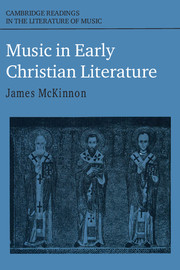Book contents
- Frontmatter
- Contents
- Preface
- Introduction
- 1 The New Testament
- 2 The Christian literature of the first and second centuries
- 3 The Greek authors of the third century
- 4 Western authors of the third and early fourth centuries: Carthage and Rome
- 5 Fourth-century Alexandria and desert monasticism
- 6 Fourth-century Asia Minor: the Cappadocians
- 7 Palestine, Antioch and Syria
- 8 The Greek historians
- 9 The Apostolic Constitutions, Egeria, and the eastern councils
- 10 Western authors of the fourth and early fifth centuries
- 11 Augustine and minor western authors
- Epilogue
- Bibliography
- Index of musical and liturgical terms and concepts
8 - The Greek historians
Published online by Cambridge University Press: 05 June 2012
- Frontmatter
- Contents
- Preface
- Introduction
- 1 The New Testament
- 2 The Christian literature of the first and second centuries
- 3 The Greek authors of the third century
- 4 Western authors of the third and early fourth centuries: Carthage and Rome
- 5 Fourth-century Alexandria and desert monasticism
- 6 Fourth-century Asia Minor: the Cappadocians
- 7 Palestine, Antioch and Syria
- 8 The Greek historians
- 9 The Apostolic Constitutions, Egeria, and the eastern councils
- 10 Western authors of the fourth and early fifth centuries
- 11 Augustine and minor western authors
- Epilogue
- Bibliography
- Index of musical and liturgical terms and concepts
Summary
If one notes a manifestation of the historical impulse in the Gospels and Acts of the Apostles, this quality is substantially lacking in the patristic writings of the second and third centuries. It reasserts itself, however, in the person of Eusebius of Caesarea (d. 339), perhaps because he was a firsthand witness to the momentous events of the early fourth century. In about 325 he completed his famous Ecclesiastical History. It is not only the first church history, but the inspiration of most of those to follow; indeed subsequent church histories, east and west, were essentially continuations of his work. The three most notable eastern examples are those of Socrates, Sozomen and Theodoret of Cyrus; they all bear the title Ecclesiastical History and run along parallel lines, extending the story to the first half of the fifth century. Considered historiographically, these works, along with that of Eusebius, have the virtue of maintaining a rough chronology while presenting many valuable primary sources. Needless to say they are apologetic in purpose and cannot be expected always to meet modern standards of objectivity. The four of them, in any case, leave us a number of interesting passages on liturgical music.
Eusebius of Caesarea (C.260–C.340)
He is unique among church fathers in the way he straddles two eras, somewhat reminiscent of Monteverdi in music. He is also unique in that beyond the more conventional sort of patristic subject matter, he wrote the first history of the Church.
- Type
- Chapter
- Information
- Music in Early Christian Literature , pp. 96 - 107Publisher: Cambridge University PressPrint publication year: 1987



